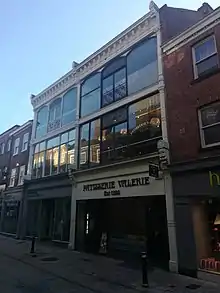.jpg.webp) View south on Feasegate, in 2020 | |
Location within York | |
| Location | York, United Kingdom |
|---|---|
| Coordinates | 53°57′33″N 1°04′59″W / 53.9593°N 1.0831°W |
| North end | St Sampson's Square |
| South end | Market Street |
Feasegate is a street in the city centre of York, in England.
History
The street lies over the south corner tower of the walls of Roman Eboracum. The street was in existence by the Jorvik period, from which period there are substantial deposits, including evidence of craft working. The name of the street comes from the Old Norse word for "cow house", and the street itself was first recorded in 1256.[1][2]
William Etty was born at the now-demolished 20 Feasegate in 1787.[3] None of the current buildings on the street date to earlier than the 18th century.[1]
The street forms part of the city's central shopping area. However, by 2018, it had only one stand-alone shop, with other properties being empty, or in use for food businesses.[4]
Layout and architecture

The street runs south from St Sampson's Square to Market Street. Notable buildings on the west side include 1 Feasegate, built in 1770 by Robert Woodhouse;[5] 5 and 7 Feasegate, designed by W. Brown in 1885, and with what Nikolaus Pevsner described as "a remarkably radical piece of work", with a wrought iron a plate glass front;[6] the three-storey 7a Feasegate, built in the late 19th century;[1] and the mid-19th century 19–23 Feasegate.[7] On the east side lies 4 and 6 Feasegate, built about 1840.[8]
References
- 1 2 3 An Inventory of the Historical Monuments in City of York, Volume 5, Central. London: HMSO. 1981. Retrieved 7 August 2020.
- ↑ "Character Area Eleven: Central Shopping Area". City of York Council. Retrieved 10 August 2020.
- ↑ Robinson, Leonard (2007). William Etty. McFarland. ISBN 9780786425310.
- ↑ "Store set to close in York city centre – leaving just one shop on the street". York Mix. 29 January 2018. Retrieved 10 November 2022.
- ↑ Historic England. "1 Feasegate and 1 St Sampson's Square (1257865)". National Heritage List for England. Retrieved 10 November 2022.
- ↑ Pevsner, Nikolaus; Neave, David (1995). The Buildings of England: Yorkshire: York and the East Riding. London: Penguin. ISBN 0140710612.
- ↑ Historic England. "19, 21 and 23, Feasegate (1257835)". National Heritage List for England. Retrieved 10 November 2022.
- ↑ Historic England. "4 and 6, Feasegate (1257831)". National Heritage List for England. Retrieved 10 November 2022.